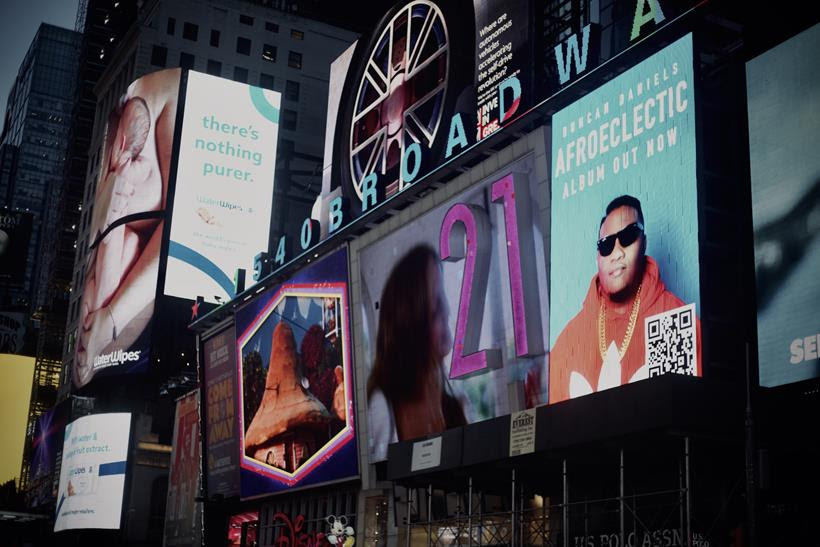Duncan Daniels’ new album ‘Afroeclectic’ is a sexy, mellow and charming body of work.
Like the title of the album implies, Daniels offers his own brand of Afrobeats, which is a cooler and less frenetic version. While the album does not offer you the fast-paced melodies and hooks of your typical Afrobeats project, it offers something more refreshing, enchanting and mature.
Duncan Daniels‘ Afroeclectic Album Ad Displays in New York Time SQ
‘Afroecletic’ starts with the cool ‘Gbedu’ that showcases a slight influence of Fela Anikulapo-Kuti’s Afrobeat genre. The track features the saxophone, which is now the trend for many Afrobeats productions. The opener gives off a late night, suave style vibe which sets the mood for the rest of the LP.
‘Holiday’, continues with the album’s sonic sleek style. It is an effortless blend of R&B and contemporary Nigerian pop stylings. When Daniels says “I’ve got no time for the airport, private jet like the airforce, everyday is a holiday” you know he is talking about that jet-setting, playboy kind of lifestyle.
The album is not all about a cruise on the fast lane of luxury. There is a warning sign ahead and it is in the shape of a seductress. “Girl you wan put me for trouble” sings Duncan Daniels in pidgin English about a woman who has a grip on his soul. The vocals of Lyn are smoky and further drills down on the lusty vibe of the song.
Forget the fast, hectic dance steps of Afrobeats, this album induces slow grinds at exclusive, expensive bars, lounges and clubs late at night. “Like a Piston…Omoge is a vixen” sings Duncan Daniels as he serenades his listeners into a world where seduction is the order of the day.
Late night vibes pops up again with the elegant use of the sax on ‘Fix That’ which sees Duncan Daniel play the role of a dashing love doctor.
‘Six Past Six’ is a cornerstone of this album. All the wooing and seduction serves as a forerunner to this moment- the rendezvous back home. It represents the moment when your love interest pulls up at your crib for quality time under the sheets. Just make sure you don’t disturb the neighbors.
The first and only reflection of the type of Afrobeats that has taken the world by storm is on ‘Enado’. It’s a dance number and possesses Don Jazzy-like melodies and easy rhyme schemes. It is meant to get you on the dance floor and sweat more than a little bit.
‘Oluwa Design’ is not the best follow-up to this track but the album picks up again with the airy and breezy ‘Eye Service’. The dash of Igbo on this song might make it a crowd favorite.
The project ends with the track ‘Summer Love’ which is a blend of R&B, and Caribbean influenced pop music.
The production on this album is top drawer. It is lush and sticks to the late night theme that Duncan Daniels surely wanted this album to be about and the instrumentals do not steal the show like most Afrobeats tracks do, they play the role of the perfect backdrop to the voice of the singers.
If you are in search of something different but still familiar, Afroeclectic is the album for you. It’s a slow and enjoyable trip into a world of love and good vibes.
Album Review by Ayomide O. Tayo
Senior Editor, Opera News
DUNCAN DANIELS – AFRO ECLECTIC FAN LINK
The post Afroeclectic by Duncan Daniels Is The Perfect Late Night Companion appeared first on Latest Naija Nigerian Music, Songs & Video - Notjustok.
from Latest Naija Nigerian Music, Songs & Video – Notjustok
via EDUPEDIA



Comments
Post a Comment